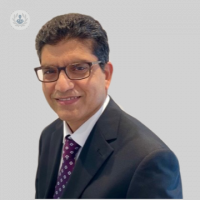Thyroid cancer: Essential information for patients
Written in association with:Thyroid cancer affects the thyroid gland, a small, butterfly-shaped organ located at the base of the neck. This gland produces hormones that regulate your metabolism, heart rate, and body temperature. Thyroid cancer is relatively uncommon but can have a significant impact on your health. Renowned consultant ENT surgeon Mr Ijaz Ahmad provides a guide to address common questions and concerns about thyroid cancer.

What are the symptoms of thyroid cancer?
Thyroid cancer often presents with few symptoms in its early stages. However, as the disease progresses, you might notice a lump or swelling in the neck, trouble swallowing or breathing, a hoarse voice, or persistent pain in the neck or throat. These symptoms can be caused by other conditions, so it’s essential to consult with a healthcare professional for a proper diagnosis.
How is thyroid cancer diagnosed?
If your doctor suspects thyroid cancer, they will conduct a thorough physical examination and review your medical history. They may order imaging tests, such as an ultrasound or a radioactive iodine scan, to get a detailed look at the thyroid. A biopsy, where a small sample of thyroid tissue is removed and examined under a microscope, is usually required to confirm the diagnosis. Blood tests may also be performed to measure thyroid hormone levels and check for markers associated with thyroid cancer.
What are the different types of thyroid cancer?
There are several types of thyroid cancer, each with its characteristics and treatment approaches. The most common types include papillary thyroid cancer, the most prevalent type, which tends to grow slowly and often spreads to lymph nodes; follicular thyroid cancer, which also grows slowly but is more likely to spread to other parts of the body; medullary thyroid cancer, which is less common and can be associated with genetic syndromes, often diagnosed through blood tests for calcitonin, a hormone produced by the thyroid; and anaplastic thyroid cancer, a rare and aggressive form that is more challenging to treat.
What treatment options are available?
Treatment for thyroid cancer depends on the type and stage of the cancer, as well as your overall health. Common treatments include surgery, the primary treatment which involves removing part or all of the thyroid gland. In some cases, nearby lymph nodes are also removed. Radioactive iodine therapy, which is used after surgery to destroy any remaining cancer cells, involves taking a radioactive iodine pill or liquid. External beam radiation therapy uses high-energy rays to target and kill cancer cells, typically reserved for more advanced cases. Chemotherapy, which uses drugs to kill cancer cells, is generally used for anaplastic thyroid cancer or when other treatments have not been effective. Targeted therapy focuses on specific molecules involved in cancer cell growth and survival, often used for advanced thyroid cancers.
How can I manage my health after treatment?
After treatment, you will need regular follow-ups with your healthcare team to monitor for any signs of recurrence and manage any long-term side effects. This may include periodic blood tests, imaging tests, and physical exams. Maintaining a healthy lifestyle, including a balanced diet and regular exercise, is crucial for your overall well-being.
Your doctor may also recommend thyroid hormone replacement therapy if your thyroid has been removed or significantly impacted by treatment. It’s important to communicate openly with your healthcare team and report any new symptoms or concerns promptly. Being informed and proactive about your health can significantly impact your quality of life and recovery.
If you would like to book a consultation Mr Ahmad, do not hesitate to do so by visiting his Top Doctors profile today.


